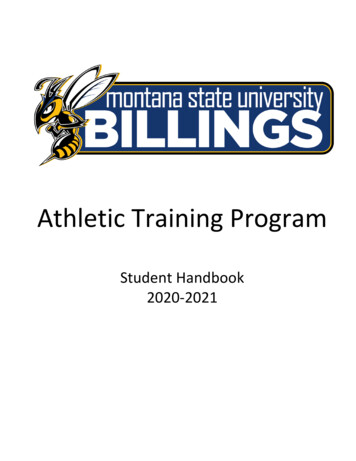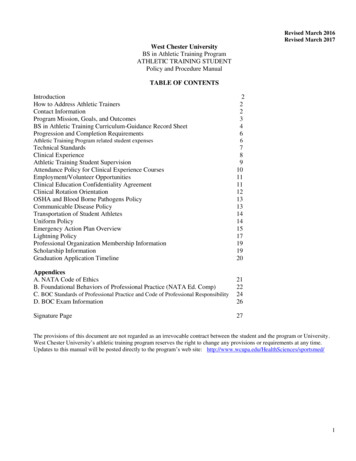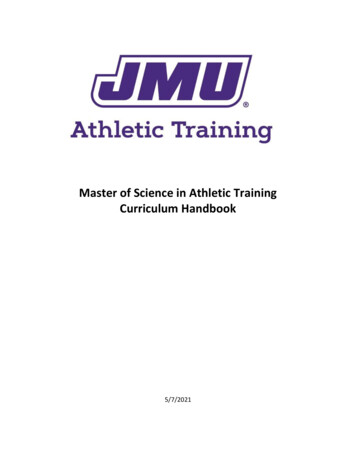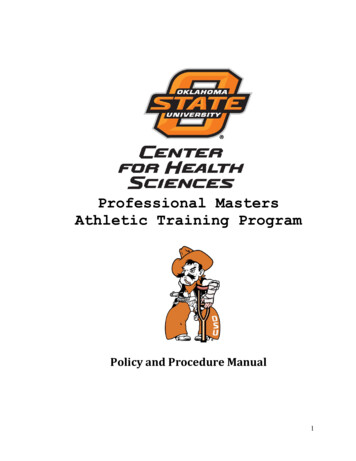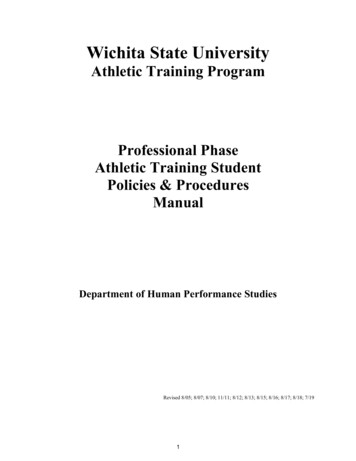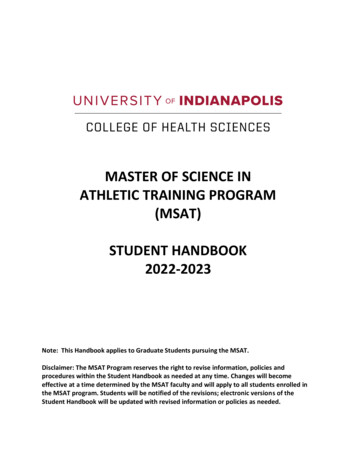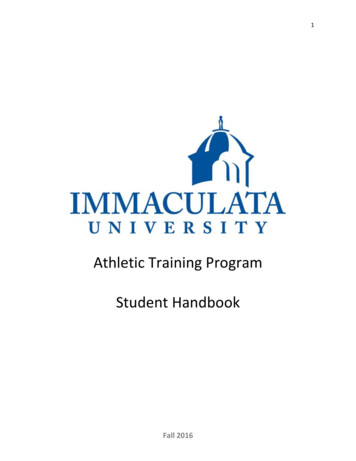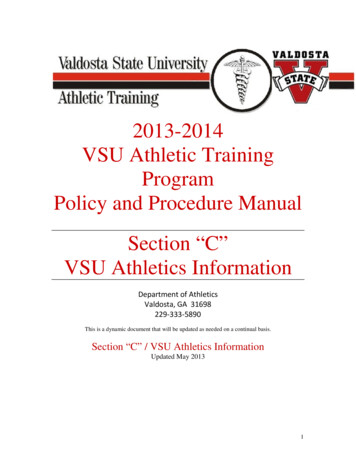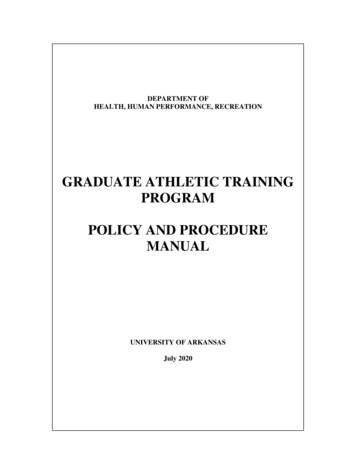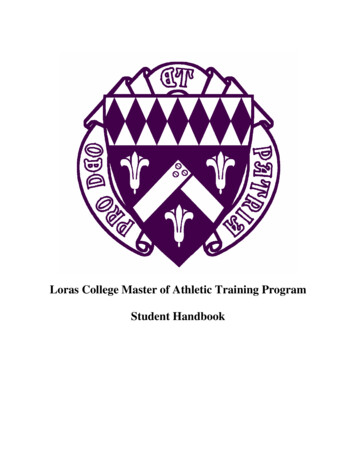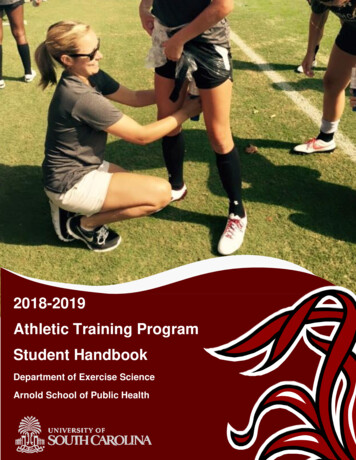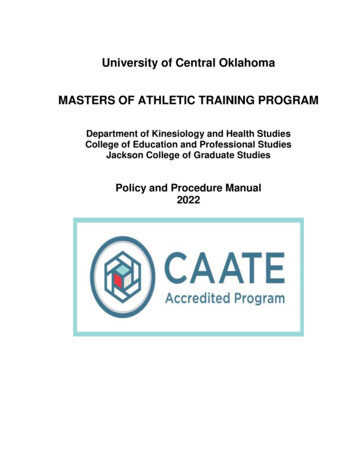
Transcription
University of Central OklahomaMASTERS OF ATHLETIC TRAINING PROGRAMDepartment of Kinesiology and Health StudiesCollege of Education and Professional StudiesJackson College of Graduate StudiesPolicy and Procedure Manual2022
TABLE OF CONTENTS Information Acknowledgement FormProgram Information and Policies 34Program Contact InformationVision and Mission StatementsOverview and History and BOC Pass RatesDefinition of Athletic TrainerNATA and ECE Athletic Training Education OverviewNon-Discrimination PoliciesBasic Financial Costs /Liability Notice / Confidentiality StatementAcademics / Clinical Information45667991011Academic Major and AdvisorsGraduation RequirementsCurriculum and Plan of StudyCourse SequencingProgression and Retention CriteriaAttendance PolicyProbation and SuspensionAcademic Appeals Process and Grievance ProceduresStudent Honor CodeClinical Program-Program Rules and Regulations11111213141414141516Clinical Program RequirementsUniversity Background Checks PolicySupervision Policy – Unqualified CI Plan161616Social Media and Athlete Interaction Policy16Clinical Program Procedures / ExplanationPreceptor Supervision PolicyClinical Assignment ProceduresPost Admission Requirements during the Pre-Professional LevelPlan for Formal Clinical Skill EvaluationFoundational Behaviors of Professional PracticeEssential Functions – Technical StandardsBlood borne Pathogen – Exposure PlanCommunicable Disease / Health Care StandardsWork PolicyStudent Liability InsuranceProfessional MembershipsUniversity Closed Policy –Clinical RotationProgram Travel Policy and Appropriate DressOK Board of Medical Licensure/SupervisionBOC Standards of Professional PracticeAthletic Training Glossary TermsMATP Forms and Appendices Appendix A – BBP Detailed Exposure Plan Appendix B - Level I Modality Instruction & Documentation Form18212123243332363637373838383940444848562
Information, Manual, Advisement Confidentiality, Communicable Disease/BBP/ DetailedExposure Plan and Disclaimer Acknowledgement FormStudent’s CopyI,(Please Print)acknowledge, on this date,that I have received, reviewedwith the program director, read and understand the requirements of the Masters of AthleticTraining Program. I agree to comply with the University, College, Department and MATPRules and Regulations during my time in the program. I have been advised and understandthe academic, Technical Standards, BBP/Communicable Disease Policy with DetailedExposure Plan and clinical requirements to complete the program. I understand that if I haveany questions regarding the University or MATP graduation requirements that I will seekinformation from the program director and/or the graduate counselor.I also acknowledge that I have read and understand the Confidentiality Statement and willabide by the provisions of the policy to protect the personal and medical information of theathletes/patients (HIPAA and FERPA) that I am assisting during my clinical education,rotations or experiences. I acknowledge that I will follow all laws related to the OklahomaBoard of Medical Licensure and Supervision Apprenticeship Athletic Trainers requirements.I also acknowledge that I understand the requirements for clinical education and traveling offcampus as part of the field experience. I agree to adhere to all UCO policies for the duration ofthe field experience. I have emergency contact information in the program director’s officeand by signing below, waive and release of responsibility for the university, affiliated site, otherfield experience opportunity, preceptor and the instructor of record related to my off-campustravel as per University Policy.Signature:Date:Witnessed:Date:Mr. Ed Sunderland, Program Director3
Program Contact InformationUniversity of Central Oklahoma100 North University DR.Edmond, OK 73034-5209405-974-2000Mr. Ed Sunderland, M.S., LAT, ATCProgram Director015 Wantland Hall, Box 189405-974-5239jsunderland@uco.eduMs. Megan Bolin, M.S., LAT, ATCClinical Education Coordinator015 Wantland Hall, Box 189405-974-2959mbolin7@uco.eduDepartment of Kinesiology and Health StudiesDr. Debra Traywick, Ed.D, Chair102 Wantland Hall, Box 189405-974-5230dtraywick@uco.eduCollege of Education and Professional StudiesDr. Bryan Duke, Ph.D., Interim Dean213 Education Building405-974-5529bduke@uco.eduJackson College of Graduate StudiesDr. Jeanetta Sims, Ph.D., Dean404 Nigh Center, Box 117405-974-3493gradcoll@uco.eduAthletic Training Classroom and LabEducation Building Room 2124
Vision and Mission StatementsMATP VisionThe Masters of Athletic Training Program, using transformative learning as the foundation foreducational delivery, will be an academic program of distinction for the University in the area ofathletic training and allied-health care education.MATP MissionThe mission of the Masters of Athletic Training Program is to provide transformativeeducational opportunities for students to achieve intellectual, professional, personal andcreative growth within a nationally accredited curriculum in the field of athletic training toservice the health care needs of Oklahoma.Core Values: Community Character CivilityTenets: Discipline Knowledge Global and Cultural Competencies Health and Wellness Leadership Research, Scholarly and Creative Activities Service Learning and Civil EngagementGoals:The Masters of Athletic Training Program will:1. Provide students the opportunity to complete an accredited program of study thatwill provide them with the knowledge and clinical skills to become Certified AthleticTrainers.2. Provide students the opportunity to learn, develop and apply critical thinking,decision-making skills necessary to become an allied-health care provider.3. Provide students opportunity to learn, develop and demonstrate ethical leadershipand professional behaviors as they relate to health care in a global societyKHS Department MissionThe Department of Kinesiology and Health Studies focuses on the preparation of professionalsin the fields of health and wellness, physical education and athletic training.College of Education and Professional Studies VisionA learning community composed of knowledgeable and caring professionals committed toempowering individuals so they may be knowledgeable, creative and ethical as they contributeto the dynamic global society.College of Education and Professional Studies MissionOur mission is facilitating the development of individuals and delivering programs and servicesto meet the needs of the professional communities served by the college.5
Jackson College of Professional Studies MissionThe Jackson College of Graduate Studies provides access to graduate education for culturallydiverse students locally, nationally, and internationally, while supporting UCO’s mission oftransformative learning through processes which maintain and enhance quality.University Mission StatementThe University of Central Oklahoma (UCO) exists to help students learn by providingtransformative education experiences to students so that they may become productive,creative, ethical and engaged citizens and leaders serving our global community. UCOcontributes to the intellectual, cultural, economic and social advancement of the communitiesand individuals it serves.University Vision StatementThe University of Central Oklahoma will be one of the nation’s top metropolitan universities,serving our community while providing our students the opportunities to achieve their highestlevel of leadership potential.What do Athletic Trainers Do?http://www.nata.org/athletic-trainingNATA and EAC ATHLETIC TRAINING EDUCATION OVERVIEWNATA MissionThe mission of the National Athletic Trainers’ Association is to enhance the quality of health careprovided by certified athletic trainers and to advance the athletic training profession.Athletic Training EducationAthletic training is an academic major or graduate equivalent major program that is accredited by theCommission on Accreditation of Athletic Training Education (CAATE). The current minimum entry pointinto the profession of athletic training is the baccalaureate level, however it was recently decided by theAT Strategic Alliance that the minimum professional degree level will be a master's, a change to beimplemented within the next several years. More than 70 percent of athletic trainers hold at least amaster’s degree. Upon completion of a CAATE-accredited athletic training education program, studentsbecome eligible for national certification by successfully completing the Board of Certification, Inc.(BOC) examination.Education AdvancementThe NATA Education Advancement Committee's mission is to identify short-term and long-termeducational research priorities, to advance evidence-based scholarship, and to continually assess bestpractices related to athletic training education in order to enhance clinical practice and patient care. Thecommittee works in collaboration with the NATA Foundation to identify and support critical areas ofeducational research that will benefit NATA members and the profession as a whole, ultimatelyenhancing patient care and improving health outcomes.Professional EducationProfessional training education uses a competency-based approach in both the classroom and clinicalsettings. Using a medical-based education model, athletic training students are educated to providecomprehensive patient care in five domains of clinical practice: prevention; clinical evaluation anddiagnosis; immediate and emergency care; treatment and rehabilitation; and organization and6
professional health and well-being. The educational requirements for CAATE-accredited athletictraining education programs include acquisition of knowledge, skills and clinical abilities along with abroad scope of foundational behaviors of professional practice. Students complete an extensive clinicallearning requirement that is embodied in the clinical integration proficiencies (professional, practiceoriented outcomes) as identified in the Athletic Training Education Competencies (PDF).Students must receive formal instruction in the following specific subject matter areas identified in theCore Competencies: Evidence-Based practicePrevention, Health Promotion, and WellnessPatient-Centered CarePatient/Client CareInterprofessional Practice and Interprofessional EducationHealth Care AdministrationHealth Care InformaticsProfessionalismQuality ImprovementClinical EducationStudents are required to participate in a minimum of two years of academic clinical education. Throughthese experiences, students must gain clinical experiences associated with a variety of different patientpopulations defined but not limited to gender, varying levels of risk, utilization of protective equipment,and general medical conditions (e.g. diabetes, asthma) that address the continuum of care. Clinicalexperiences provide students with opportunities to practice, under the direct supervision of qualifiedPreceptors (i.e., Certified Athletic Trainer [ATC ] or other credentialed health care professionals).What is Athletic Training?Athletic training encompasses the prevention, examination, diagnosis, treatment and rehabilitation ofemergent, acute or chronic injuries and medical conditions. Athletic training is recognized by theAmerican Medical Association (AMA), Health Resources Services Administration (HRSA) and theDepartment of Health and Human Services (HHS) as an allied health care profession.Who are Athletic Trainers?Athletic trainers (ATs) are highly qualified, multi-skilled health care professionals who collaborate withphysicians to provide preventative services, emergency care, clinical diagnosis, therapeutic interventionand rehabilitation of injuries and medical conditions. Athletic trainers work under the direction of aphysician as prescribed by state licensure statutes. The NATA Code of Ethics states the principles ofethical behavior that should be followed in the practice of athletic training.Athletic trainers are sometimes confused with personal trainers. There is, however, a large difference inthe education, skillset, job duties and patients of an athletic trainer and a personal trainer. The athletictraining academic curriculum and clinical training follows the medical model. Athletic trainers mustgraduate from an accredited baccalaureate or master’s program, and 70% of ATs have a master’sdegree. Learn more about the Education of athletic trainers.The Guide to Athletic Training Services (pdf) describes the qualifications of athletic trainers and theclinical tasks they routinely perform in the delivery of quality health care.You can learn more about the profession by reading the Becoming an AT (pdf), Profile of AthleticTrainers (pdf) and Who is Taking Care of Your Athletes? (pdf) infographics.Athletic Trainers (ATs) are healthcare professionals who render service or treatment, under thedirection of or in collaboration with a physician, in accordance with their education and training7
and the states' statutes, rules and regulations. As a part of the healthcare team, servicesprovided by ATs include injury and illness prevention, wellness promotion and education,emergent care, examination and clinical diagnosis, therapeutic intervention, and rehabilitationof injuries and medical conditions. *Athletic training is recognized by the American MedicalAssociation (AMA) as a healthcare profession.*This definition is approved by the Inter-Agency Terminology Work Group and the AthleticTrainer Strategic Alliance, January 2017.THE ATC CREDENTIALThe ATC credential and the BOC requirements are currently recognized by 49 states foreligibility and/or regulation of the practice of athletic trainers. The credibility of the BOCprogram and the ATC credential it awards are supported by three pillars: (1) the BOCcertification examination; (2) the BOC Standards of Professional Practice, and DisciplinaryGuidelines and Procedures; and (3) continuing competence (education) requirements.BOC certification is recognized by the National Commission for Certifying Agencies and is theonly accredited certification program for athletic trainers. To be certified, an individual mustdemonstrate that he/she is an athletic trainer capable of performing the required duties withoutthreat of harm to the public. The BOC traditionally conducts annual examination developmentmeetings during which certified athletic trainers and recognized experts in the science ofathletic training develop, review and validate examination items and problems. The knowledge,skills, and abilities required for competent performance as an athletic trainer fall into threecategories:1. Understanding, applying, and analyzing;2. Knowledge and decision-making;3. Special performance abilities.BOC certified athletic trainers are educated, trained and evaluated in five major practicedomains as defined by the Role Delineation Study / Practice Analysis, 7th Ed: Injury/Illness Prevention and Wellness Protection Examination, Assessment and Diagnosis Immediate and Emergency Care Therapeutic Intervention Healthcare Administration and Professional ResponsibilityWeighting of DomainsThe PA7 defines the current entry-level knowledge, skills and abilities required for practice inthe profession of athletic training. The practice analysis serves as the blueprint for determiningthe content of the exam. Exam questions represent all five domains of athletic training, withweighting distributed across domains as indicated in the table belowDomainPercent of Questions on examInjury and Illness Prevention and Wellness Promotion19.8Examination, Assessment and Diagnosis24.3Immediate and Emergency Care15.5Therapeutic Intervention27.4Healthcare Administration and Professional Responsibility13.0Sum100.08
For more information regarding the educational, certification, and licensure requirements forathletic trainers visit:The National Athletic Trainers’ Association – www.nata.orgThe National Athletic Trainers’ Association Education Council itteeThe Board of Certification – www.bocatc.orgThe Commission on the Accreditation of Athletic Training Education Programs– www.caate.netNon-Discrimination PoliciesIn compliance with University policy, the Masters of Athletic Training Education Program doesnot discriminate for admissions, progression or placement on the basis of race, color, religion,national origin, gender, disability, age, sexual orientation or status as a veteran.UniversityEqual Opportunity StatementThe University is committed to an inclusive educational and employment environment thatprovides equal opportunity and access to all qualified persons. The University will continue itspolicy of fair and equal employment and educational practices without discrimination orharassment because of actual or perceived race, creed, color, religion, alienage or nationalorigin, genetic information, ancestry, citizenship status, age, disability or handicap, gender,marital status, veteran status, sexual orientation, gender identity or expression, or any othercharacteristic protected by applicable federal, state, or local laws. Discrimination orharassment in violation of this policy should be reported to the Affirmative Action Officer (Officeof General Counsel) in person at Old North 304 or by phone at (405) 974-3377 or fax at (405)974-3807. After office hours or on holidays, the report may be made by contacting UniversityPolice Services at (405) 974-2345.Basic Financial Fee Costs, Scholarship and Student Employment of MATPCost of attending the University can be found on Graduate College web page,http://www.uco.edu/graduate/ or in the current Graduate Catalog under Tuition and Fees or onthe following University webpage, ces/tuition-and-feesMATP approximate costs are listed below. Costs may vary. Travel cost may depend onlocation of affiliated site or clinical rotations. Additional information can be provided by programdirector or clinical coordinator.1. There will be a course or lab fee assessed to each course by the department.Typically, the assessed fees range from 5.00 to 89.00 per credit hour. SeeCourse Schedule for specific course fees amounts.2. Yearly Clinical Education Program Fee— 150.00: Uniforms, badge and personclinical equipment. This fee may be assessed on the summer Pre-professional levelcourses in addition to the regular course fees.3. Yearly TB Test - 30.00 and Flu Shots - 35.004. Criminal Background check - 15.00 - 35.005. Apprentice Athletic Trainer License for the State of Oklahoma – initial 35.00 and 15.00 per year. Also, CEPS background checks - 20.006. Yearly CPR/FA training— 30.009
7. Yearly blood borne pathogen training— 19.00-27.008. Private physical examination— 65.009. Hepatitis B Vaccination— 100.00 (required for Admission to Program)10. Yearly private liability insurance— 15.00 (The MATP student liability policy will betied to the Nursing Programs student liability policy.)11. Drug testing that may be required for certain clinical sites, approximately 40.00.12. Year membership in NATA, approximately 80.00 per year (District 5 and OATAmembership included)13. Hour and Patient Contact Tracking software – Approximately Yearly 45.00 or 90for two yearsIt is the student’s responsibility to provide transportation to off-campus clinical sites, doctoroffices, hospitals, outreach, observations and educational seminars related to the clinicaleducation. Access to transportation is required to complete the clinical courses.Transportation costs are estimated at approximately 150.00 per semester.There are no MATP scholarships or Out-of-State tuition waivers at this time. All work-studyopportunities are related to financial aid eligibility and handled through the Financial Aid Office.See the head athletic trainer for work related employment opportunities which are servicedbased and not related to the academic studies. MATP students may apply for the Departmentof Kinesiology and Health Study Teaching Assistants. This is a separate application withseparate requirements beyond the MATP admission. Contact the KHS department chair formore information.Liability and Responsibility NoticeUCO is not responsible for injury or illness as a result of participation in clinical education.Medical and insurance information can be found in Graduate asp : Whether enrolled in an on-campus class or ina UCO internship, practicum, course or activity involving domestic or foreign travel, you areresponsible for your own medical treatment and are liable for your own actions. In the event ofyour injury or illness while participating in a UCO sponsored activity, UCO cannot approve aclaim for treatment or reimbursement. Information on insurance is available in the Office of theVice President for Student Services. Also, a number of reasonably priced insurance policiesare available from the private business sector. We strongly encourage you to invest in theappropriate coverage.”Confidentiality StatementAs MATS, you MUST recognize, appreciate and understand the importance of completeConfidentiality regarding each patient and athlete you are working with. The NATACode of Ethic and State law requires that athletic trainers follow and abide by theconfidentiality agreement that exists between an allied health professional and thepatient. At no time is it acceptable to give out information to anyone regarding anathlete’s personal, medical, injury, or rehabilitation information. Personal/medicalinformation is property of the athlete/patient and YOU do not have the right to distributeit to anyone without a signed written consent. You must follow all FERPA and HIPAALaws. Not even to other players. University, athletic department and specific coachesmay be allowed to obtain the information because the student athlete has signedspecific documents. Do not take a chance; refer all inquiry to the supervising certified10
athletic trainer (Preceptors) or team doctor. Never give out information to the mediaand professional scouts. They will try to find out as much as they can in a simpleconversation. Just politely refer them to your supervisor. Never discuss specificplayer/patient information outside of the clinical environment at any time!The consequence for unethical behavior may lead to probation/suspension from theprogram. See Student Honor Code for specific disciplinary procedures.Review NATA Code of Ethics, the State of Oklahoma Board of Medical Licensing andSupervision, Athletic Trainers Act, rules and regulations for confidentiality and ethicalbehavior standards. Everyday strive to implement the Foundational Behaviors ofProfessional Practice during your clinical education experiences.Academics / Clinical InformationAcademic Degree and MajorUpon completion of program the University of Central Oklahoma, by the authority of theOklahoma State Regents for Higher Education, will grant the student a Master in AthleticTraining degree. The MATP is housed in the Department of Kinesiology and Health Studieswithin the College of Education and Profession Studies and the Jackson School of GraduateStudies.Academic AdvisorsYour academic advisor will be the Program Director. It is required that you meet with ProgramDirector each semester for academic and program advisement. They will advise you on alluniversity requirements for graduation. See Graduate Catalog for details of all requirements.Graduation Requirements1. Meet all University and Graduate College requirements.2. Complete all Masters of Athletic Training Education Program academic requirements.3. Earn a “B” or better in each Masters of Athletic Training Education Program majorcourses.4. Overall GPA of 3.00 or higher with no more than 6 hours of “C,” and no more than sixadvisor-approved hours from traditional correspondence courses5. Meet all clinical program requirements of MATP.Other Requirements1. Plan of Study. File a Plan of Study with Mr. Sunderland and the Jackson College ofGraduate Studies by the end of the first semester of graduate work. The plan must besigned and dated by the student and the graduate advisor before it can be consideredofficial.2. Final Requirements. Fulfill the all graduation requirements, as listed in Graduatecatalog.Note: The amounts of all fees are subject to change. In preparation for graduation,students must obtain correct fee amounts from their program advisor or Graduate Catalog.11
Plan of StudyMATP curriculum will begin in the July semester of the first year. Accepted students enter the program at the PreClinical Level. Post-admission requirements Must be completed during Pre-Clinical Level, Semester 1. See PreClinical requirements for details. Courses Must be taken in exact sequence to ensure the CAATE Standard thatprovides a logical progression of increasingly complex and autonomous patient-care and client-care experiencesis met. See program director for details.Curriculum (Courses listed in numbered ordered)Dept: #Course TitleHLTH 5433Quantitative Methods (or Substitute)KINS 5313Prevent. & Health Promotion PrinciplesKINS 5321Interprofessional Education IKINS 5343Exam & Diagnosis IIKINS 5381Interprofessional Education IIKINS 5363Exam & Diagnosis IIIKINS 5413Athletic Training Clinical IKINS 5433Therapeutic Interventions IKINS 5443Athletic Training Clinical IIKINS 5513Exam & Diagnosis IVKINS 5523Therapeutic Intervention IIKINS 5613Therapeutic Interventions IIIKINS 5623Exam & Diagnosis IKINS 5633Transition to PracticeKINS 5713Patient Centered Care AdministrationKINS 5723Psychosocial InterventionsKINS 5733Athletic Training Clinical IIIKINS 5743Athletic Training Clinical IVClinical Levels / Prefix & Courses # / Academic Course TitlesPre-ClinicalKINS 5313Prevent. & Health Promo PrinciplesSemester 1 - JulyKINS 5623Examination & Diagnosis ISemester Hours331313333333333333Total50 SHHRS3Grade36 SHClinical Level IKINS 5343Examination & Diagnosis II3Semester 2 - FallKINS 5413Athletic Training Clinical I3KINS 5433Therapeutic Interventions IInterprofessional Education I3KINS 53211110 SHClinical Level IQuantitative Methods (or Substitute)Athletic Training Clinical II33KINS 5363Therapeutic Interventions IIExamination & Diagnosis IIIKINS 5381Interprofessional Education II1HLTH 5433Semester 3 - Spring KINS 5443KINS 55233313 SHClinical Level IKINS 5713Patient Centered Care Admin.3Semester 4 - JuneKINS 5723Psychosocial Interventions3Clinical Level IIKINS 5513Examination & Diagnosis IV36 SH12
Semester 5 - FallKINS 5613Therapeutic Interventions III3KINS 5733Athletic Training Clinical III39 SHClinical Level IISemester 6 - SpringKINS 5743Athletic Training Clinical IV3KINS 5633Transition to Practice36 SHGraduationTotal50 SHClinical Level Progression/Retention Criteria1. Must be in “Good Standing” with the MATP, Graduate College and University.2. Meet all MATP clinical requirements, including Drug Testing and Criminalbackground check, TB test and Flu Shots.3. Must maintain a cumulative GPA of 3.0 in athletic training major courses.4. Must earn a “B” or better in major courses.5. Must take required courses in sequence to ensure progression towards increasinglycomplex and autonomous patient-care and client-care experiences.6. Must be enrolled in at least 9 semester hours or be considered a full-time student.7. Must demonstrate ability to continue to meet Technical Standards.8. Must join the NATA9. Must purchase and use Hour & Patient Contact Tracking ApplicationAttendance PolicyClass attendance is mandatory; includes all lectures, labs, internships, rotations, assignedseminars, field trips and other mandated activities. It is the student’s responsibility toadequately manage the proper amount of time needed to be successful in the MATP. Timemanagement requires budgeting academics, clinical, work and social activities appropriately.If a MATS is ill or has an emergency arise, THEY must call or email the instructor orPRECEPTOR DIRECTLY to tell them of the absence. Class attendance for clinicaleducation/field experience will be taken; it will be documented by on the Clinical EducationVerification Form. If an ATS has three unexcused absences a letter grade may be deducted; ifsix unexcused absences or habitual lateness, the ATS may be dropped from the class. Seespecific course syllabus for details.Probation and SuspensionStudents with deficiencies in pre-professional/professional levels progression or retentionrequirements will be placed on probation for a minimum of one semester. The program directorwill outline a plan to remove the deficiencies. The plan will be signed by the student. They willbe required to attend and complete all major’s courses until probationary status is rescinded.Additional requirements of weekly study hall and tutoring will be required during academicprobation. If the plan is not completed by the designated time, the student will be suspendedfrom the program. Probation may extend the completion date of the clinical program andmay delay graduation. Students suspended from the MATP will only be allowed to retake thecourses in which they have earned a grade less than a “B” and request re-instatement to theprogram. Students have the right to appeal suspension via the Academic Appeal Process andGrievance Policy.Special Circumstances:13
1. As part of the Post Admission requirements the student will be required topass a Criminal Background Check. If they fail the background check they willnot be able to receive an Apprenticeship Athletic Training License and will beremoved for the program2. As part of the clinical program the student will be required to pass a Drug Test.If the student fails the drug test they will be placed on probation and until suchtime follow-up drug tests are negative. These tests will be at the expense of thestudent. They will be required to attend counseling at the Counseling Center oncampus (
The Masters of Athletic Training Program, using transformative learning as the foundation for educational delivery, will be an academic program of distinction for the University in the area of athletic training and allied-health care education. MATP Mission The mission of the Masters of Athletic Training Program is to provide transformative
